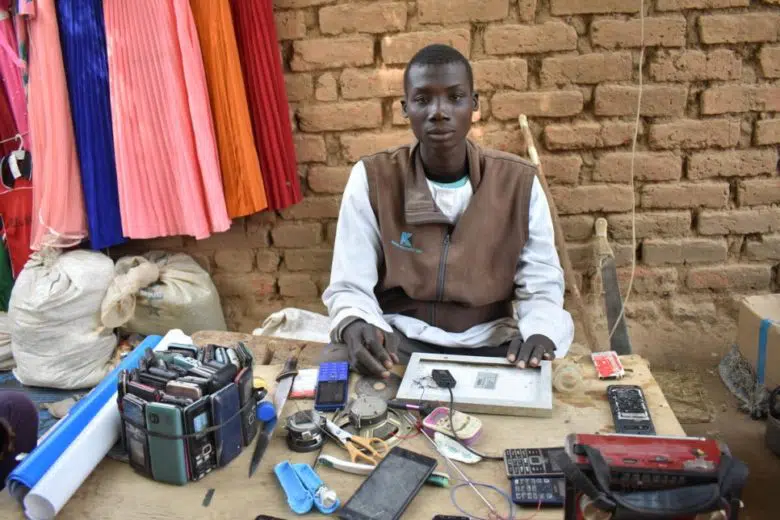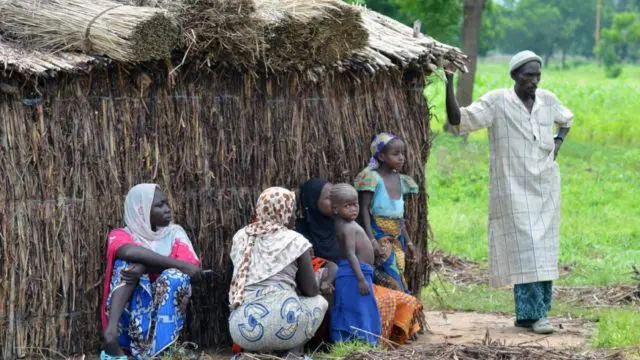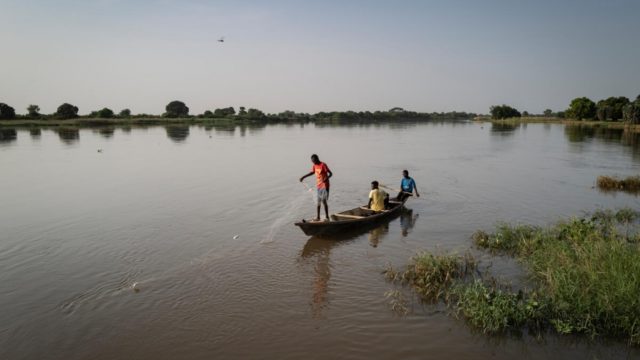
Cameroonian refugee Issa Hassane, 25, earns money repairing mobile phones at a reception site in Oundouma, Chad. © UNHCR/Aristophane Ngargoune
Unable to return home after fleeing violent clashes last month, thousands of Cameroonian refugees require assistance while many are eager to provide for themselves.
When violence erupted in his hometown of Kidam in northern Cameroon at the end of last year, Vahindi Martin Assinga’s only thought was to get his family to safety. Like thousands of others fleeing deadly intercommunal clashes in the country’s Far North region, Martin and his family sought refuge in neighboring Chad.
Having spent the past few weeks living with his wife and eight children at a reception site in Oundouma, a town near the border with Cameroon, Martin’s attention is turning to how he can provide for his family.
“In Cameroon, I was a forest guard. This allowed me to support my family and contribute to the development of my village. I was [also] part of the village development committee,” he said.
For him, relying on aid indefinitely is not an option. “I need a water pump and a piece of land to be able to farm and earn a decent living.”
On 5 December 2021, clashes broke out between herders, farmers and fishermen in the village of Ouloumsa in northern Cameroon, following a dispute over water resources that have become more scarce as a result of the climate crisis. Fighting quickly spread to neighboring villages before reaching the main commercial hub of Kousseri, leaving 44 dead, 111 injured and razing 112 villages to the ground.
In total the violence has displaced more than 100,000 people both inside Cameroon and across the border into Chad, where so far UNHCR has registered nearly 36,000 Cameroonian refugees in 31 districts. Women and children account for around 90 per cent of these registered refugees.
In recent weeks UNHCR, the UN Refugee Agency, has ramped up its operations to help those affected. Together with the authorities and other humanitarian partners, the agency is providing vital assistance to Cameroonian refugees and internally displaced people who urgently need food, shelter, blankets, mats and hygiene kits.
Most of the recently arrived refugees were taken by surprise by the violence and fled without belongings or documents. While many have been taken in and generously assisted by local host communities, there is a growing desire among many refugees to find jobs or other ways of supporting themselves.
- See also: UNHCR seeks US$59.6 million for 100,000 displaced by violence in Cameroon’s Far North region
Back in Cameroon, widowed mother of five Khadidja Herre always managed to meet the needs of her family and pay for the schooling of two of her children with her fish-selling business.
Without any work since her arrival in Chad, she says the days have dragged and her family has suffered. “I haven’t done anything since I’ve been here and my children no longer go to school,” she said.
Unwilling to consider an immediate return to Cameroon due to the security situation, she is keen to replicate her former enterprise here in Chad while waiting for calm to return.
“Resuming my business will allow me to live with dignity through my own work. I could also make sure my children go back to school.”
Some Cameroonian refugees have already found inventive ways to earn enough to meet their basic needs.
Originally from Kousseri on Cameroon’s border with Chad, Issa Hassane, 25, used to earn his living selling second-hand clothes and firewood that he collected.
Subscribe to UNHCR’s mailing list
Since his arrival in Chad, he has switched to repairing mobile phones – a skill he learned by practicing on his own phone, which enables him to earn between 1,000 and 1,500 CFA francs (US$1.7-2.6) each day.
“I repair phones of all brands. My clients include both other refugees and Chadians,” he explained.
While some such as Issa have found ways to support themselves, many thousands more remain dependent on humanitarian support. In response, UNHCR on Friday appealed for an additional US$59.6 million to meet the urgent needs of Cameroonian refugees and internally displaced people over the next six months.
Originally published by UNHCR on 21 January 2022.





